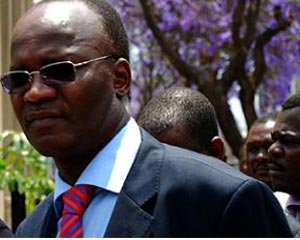
WHEN Jonathan Moyo went on a charm offensive, meeting media stakeholders after his appointment as Minister of Media, Information and Broadcasting Services in 2013, he raised a lot of hope in the media fraternity.
BY SILENCE CHARUMBIRA
Many believed Moyo had learnt that ruthlessness and treating the media as an enemy was old-fashioned, wrong and not good for his political life and that of the government.
Many thought his days in the “wilderness” after being chucked out of cabinet and Zanu PF by President Robert Mugabe had taught him a lesson that journalists were friends not foes.
However, his raves and rants in the past few weeks have shown that the old Jonathan Moyo, at whose hands the independent media was battered and bruised between 2002 and 2005, was back in full force.
The public fall of President Robert Mugabe at the Harare International airport seems to have given Moyo the platform to unleash the venom he has been known for.
He declared that government had become wiser and would in future confiscate journalists’ cameras for at least 30 days if a similar incident happened in future. The Information minister also said government could easily bar journalists from the private media from attending state events.
Moyo was again seen dominating the show after High Court Judge Justice Francis Bere’s remarks on spot fines, lambasting the learned judge and journalists.
- Chamisa under fire over US$120K donation
- Mavhunga puts DeMbare into Chibuku quarterfinals
- Pension funds bet on Cabora Bassa oilfields
- Councils defy govt fire tender directive
Keep Reading
Last year media consultant and analyst Takura Zhangazha predicted a media clampdown after the Zanu PF Congress.
He told a Media Institute for Southern Africa (Misa) workshop in Mutare that government would become radical against the media after the December congress.
He said government could not be hostile against the media because Zanu PF factions were abusing the same in their internal wars and the winning faction would definitely silence the media after December. Voluntary Media Council of Zimbabwe (VMCZ) executive director Loughty Dube said it was vital for Moyo to have cordial relationships with the media instead of trying to be heavy-handed.
He said the minister should have maintained the engagement that saw him visiting several newsrooms, including those of the independent media.
“It would be unfortunate for Moyo to be seen to be moving away from his engagement spirit and becoming bellicose. As the VMCZ we will encourage the spirit of engagement as it has long term benefits for media freedom in the country,” said Dube.
“Engagement processes that he had initiated with Impi, an enquiry into the state of the media in the country are important and they need everyone’s participation for the development of the industry,” he said.
Upon his return to government, Moyo embarked on a charm offensive in which he encouraged the media institutions to focus on nation building.
This was in sharp contrast to the Moyo of 2000 who introduced such laws as the Access to Information and Protection of Privacy Act which deregistered several independent newspapers and forced many professionals to leave the country.
Zimbabwe Union of Journalists secretary general, Foster Dongozi said it was not wise for Moyo to fight the media as his party Zanu PF was trying to project a good image internationally.
“Zanu PF wants to rebrand. That is why there is so much excitement over the signing of the deal with the European Union,” he said. “I cannot imagine anyone confiscating cameras. That will be unheard of and that will make them (government) a laughing stock of the world. Journalists actually did a good job and he should be targeting the immediate security of the President that let him fall. The fact that the pictures went viral around the world shows that this was a historic event in the life of the President.”
The Media Monitoring Project Zimbabwe (MMPZ) said by threatening to confiscate journalists’ cameras and deleting footage or images considered in bad light, Moyo has arbitrarily empowered security agents to censor media content, which violated the public’s right to be informed.
“Indeed, this incident appears to have stripped away the veneer of tolerance and understanding of media freedom that Moyo has carefully attempted to cultivate with Zimbabwe’s media community since returning to his former post following the 2013 elections,” said MMPZ in a statement.











